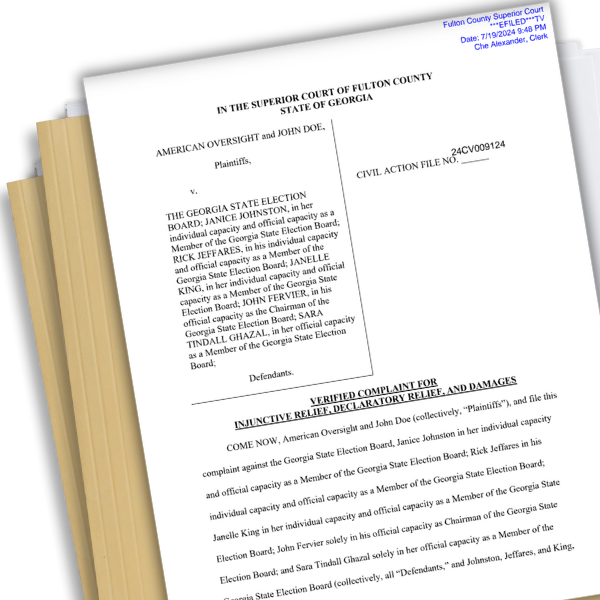
American Oversight Wins Appeal in Open Meetings Act Lawsuit Against Georgia State Election Board
The Georgia Court of Appeals reverses dismissal, clears path for our lawsuit to proceed.

Tuesday, the Georgia Court of Appeals handed American Oversight a significant victory, reversing a lower court’s dismissal of our Open Meetings Act lawsuit against the Georgia State Election Board (SEB). The appeal follows the Georgia Republican Party’s (GRP) successful motions to intervene in and dismiss our underlying lawsuit challenging the validity of the SEB’s July 12, 2024 meeting, which was held to force through controversial election-related rule changes — including rules secretly coordinated with the GRP — without adequate notification to the public or a lawfully convened quorum.
A three-judge panel of the Georgia Court of Appeals unanimously ruled that the Open Meetings Act itself waives sovereign immunity — allowing individuals and organizations to hold government bodies accountable for alleged violations of transparency law without being blocked by the doctrine of sovereign immunity. The decision affirms that government agencies cannot use sovereign immunity claims to shield themselves from scrutiny when accused of conducting public business in secret.
The ruling ensures that our lawsuit can move forward in the trial court, where we are seeking civil penalties against three board members — Janice Johnston, Rick Jeffares, and Janelle King — and recover attorneys’ fees and costs incurred in litigation.
“Today’s decision is a victory for transparency and for every Georgian who believes public business should be conducted in public,” said Chioma Chukwu, Executive Director of American Oversight. “The State Election Board tried to hide behind procedural loopholes after breaking the law, but the court made clear that no government agency is above accountability. Our lawsuit can now proceed to ensure the public learns what happened and to uphold the integrity of Georgia’s open government laws and its elections.”
According to reports, during the illegal July 12, 2024, meeting convened by board members Jeffares, King, and Johnston, the SEB considered two proposals, including one from Jeffares requiring counties to post certain election results that the Secretary of State’s office already provides, which was not previously announced or shared with the public, nor read in its entirety at the meeting itself.
Days after the meeting, we sent a letter to SEB Chair John Fervier and all board members alerting them that American Oversight and partners in Georgia may pursue legal action if the SEB did not publicly clarify by Wednesday, July 17, 2024 that the meeting violated Georgia law and that the rules it purported to approve are null and void.
Reporting indicates that board members were aware of the potential legal issues that could arise if they held the meeting. Prior to the meeting, the state attorney general’s office reportedly warned the members that convening the meeting might violate the state’s Open Meetings Act.
After a regularly scheduled meeting on Tuesday, July 9, 2024, ran long, Fervier scheduled a continuation for the next day. That meeting was eventually postponed after the board failed to meet its in-person quorum requirements. Notices of the rescheduled meeting, as well as the postponement, were circulated to the secretary of state’s “notifications@sos.ga.gov” email list, consistent with typical practice.
But late on Thursday, July 11, 2024, a document signed by Jeffares and posted outside a meeting room in the Georgia State Capitol announced that a meeting would be held on July 12, 2024, at 4 p.m., despite indication from Fervier and Sara Tindall Ghazal, the other two SEB members, that they would be unavailable.
This document was not shared to the secretary of state’s email list, nor was it posted to the SEB’s website, where meeting notices are usually posted. Additionally, of the three board members who convened the July 12 meeting, two were present in person and the third participated by video, in violation of the Open Meetings Act quorum requirements.
On July 19, 2024, we filed suit against the SEB for violating the state’s Open Meetings Act when it held the July 12, 2024 meeting without legally required public notice or a quorum. We are represented in the case by its own attorneys and by Atlanta-based law firm Caplan Cobb, LLC.
The GRP moved to intervene on July 25, 2024, and the court granted intervention. The GRP then filed a motion to dismiss, arguing the case was barred by sovereign immunity under Article I, Section II, Paragraph V of the Georgia Constitution. We opposed the dismissal, explaining that the suit arose under the Open Meetings Act, which independently waives sovereign immunity.
Despite those arguments, on Sept. 30, 2024, the court granted the GRP’s motion to dismiss and denied our motion to drop nominal defendants Fervier and Tindall Ghazal. We appealed that decision on Oct. 21, 2024, arguing that the court erred because the Open Meetings Act, not Paragraph V, governs and waives sovereign immunity, and because the court abused its discretion by refusing to allow the plaintiffs to amend and drop parties once declaratory relief was mooted.